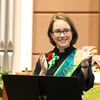
In the last installment in the Intergenerational Sunday School series, I want to get practical ... really practical.
I've shared a lot of tips over the course of this series about choosing or writing curriculum, setting up your space, recognizing generational differences, and considering learning styles when planning intergenerational Sunday School. But, of all the tips I give to church leaders trying to figure out the nitty gritty of leading an intergenerational class of any kind, this is my number one "secret" to successful intergenerational Sunday School: ensure everyone participates.
You think that sounds obvious, right?
That should be a given! And yet, after many years of leading intergenerational camp and retreat experiences, I can tell you, this is both the hardest part of intergenerational faith formation AND it's the key to making it truly intergenerational.
You see, we have very few truly intergenerational spaces or experiences left in most of our communities. You have classrooms, where adults teach kids. They're both there, but information flow is generally intended to go one way. There's a clear power structure set up there; it's not a mutual experience.
And then you have age-level activities, especially for kids. These events are designed around that age or stage, and cater to the interests, maturity, attention span and needs of that age group. While there may be folks of other generations present to facilitate, there is, again, not a mutuality to that experience.
Everyone participates: How do you get there?
Intergenerational Sunday school must be an experience that engages everyone and doesn't simply play to the lowest common denominator. So often, I see churches develop "intergenerational" experiences that are simply kids' events that parents or other adults are invited to. I'll admit, most good intergenerational experiences resemble kids' events more than traditional adult classes, but it doesn't mean they're designed just for the kids.
Adults have gotten so used to things involving kids being just for kids that they play into this idea, even when you frame it as truly intergenerational. They'll show up, stand back and defer to the kids at every turn. It's well-intentioned, but it's not what intergenerational experiences are all about. This is why it's so important that you, as the leader, ensure everyone participates.
You see, kids need to hear adults' stories. They need to hear adults ask questions. They need to hear adults answer questions, too. Intergenerational Sunday school should be a mutually contributive experience.
One simple trick
In order to do this, I've learned one simple trick, especially for new intergenerational groups. As you're going through your lesson, start by leading discussion for the whole room together. This initially sounds counter-intuitive, because the goal is to engage generations in conversation together. But to start out, lead the discussion from the front of the room, and give smaller intergenerational groups or triads time to discuss the question, and then respond to the larger group.
And here's the little trick ... for each discussion question, ask it twice: once to young people, and once to adults. Offer separate space for the adults to answer the question, separate from the kids' response time. This seems like overkill, I know, and yet, this is the simplest and most effective way I've found to ensure that the adults neither dominate the conversation nor always defer to the kids. (I also really enjoy having them each report what they heard from one another to the large group!)
However you choose to do it, though, be intentional in your leadership to ensure everyone participates. Half the battle when it comes to intergenerational Sunday school is simply getting everyone talking to one another. It's not as hard as you think; it's absolutely do-able, and YOU can do it!



